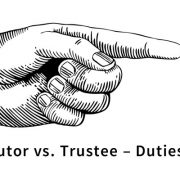Terminating Irrevocable Trusts I: Changing What Can’t Be Changed
Baron Law LLC, Cleveland, Ohio, offers information for you to reflect upon while you are setting out looking for an estate planning attorney to help protect as much of your assets as you can. For more comprehensive information contact Baron Law Cleveland to draft your comprehensive estate plan to endeavor to keep more of your assets for your heirs and not hand them over to the government by way of taxes.
Irrevocable trusts are trusts in which the grantor, i.e. the trust maker, relinquishes all control and ownership over the trust and the assets used to fund the trust. Thus, in theory, the trust can only be changed or canceled per the ways denoted by trusts terms and usually only then with the blessing of the trustee and/or trust beneficiaries.
So, why would anyone give up control to another and chose to use irrevocable trusts? Conversely with living trusts, grantors keep “the keys” to the trust while with irrevocable trusts “the keys” are given up. In the eyes of the law, generally, what is inside an irrevocable trust no longer belongs to the grantor. Thus, grantors aren’t taxed on what’s inside these trusts and those with claims against the grantor can’t extend potential recovery to these assets as well. This is all well and good, but with everything in life, situations change. A previous estate plan, and accompanying established trusts, sometimes no longer serve the best interest of the grantor and their family. With current sky-high estate tax exemptions, the normal administrative costs associated with trust management, and, perhaps, an adjusting need for liquidity or differing type of asset control, some individuals are evaluating whether it’s worth keeping an irrevocable trust. If this is you, don’t despair. Despite what their name suggests, irrevocable, there are ways to terminate an irrevocable trust. Before, however, anything drastic like trust termination occurs, always consult an experienced Cleveland estate planning attorney to figure out all your options and plot the best course of action.
Now if after consultation with professionals regarding your estate plan reveals that your irrevocable trust no longer serves your best interests, termination is an option. There are several methods for terminating trusts in Ohio, termination by court order, termination via private agreement, and termination by discretionary distribution. This blog concerns primarily the first method, court ordered trust termination.
1.Court-Ordered Trust Termination
In 2007 Ohio passed the Ohio Trust Code which governs the creation, management, and termination of trusts. Chapter 5804 primarily is the vehicle courts use to terminate trusts depending on the circumstances. Now, the most common circumstances in which this method of termination is used is either via independent motion on a probate court to terminate a trust for justifiable cause or as a recovery prayer in a civil suit that someway touches on a trust significantly enough to justify termination. Again, consult an experienced Ohio estate planning attorney, they will know when, how, and where to commence trust termination proceedings.
A.Trust Termination by Revocation or by Terms
Per O.R.C. § 5804.10, a trust may be terminated to the extent that a court finds that:
- It is revoked or expired pursuant to its terms;
- There is no remaining purpose of the trust to be achieved;
- The purpose of the trust has become unlawful or impossible.
This particular code section denotes the authority/power of the court to terminate a trust. The respective standing, or ability, for a grantor, trustee, and trust beneficiary to petition to terminate a trust are also denoted within the Ohio Trust Code. Note, however, that within R.C. § 5804.10 no mention of settlor, trustee, or beneficiary consent is denoted. This means that if a court thinks termination of a trust is appropriate, they can do so. Now whether or not a particular probate court will take the feelings and considerations of the settlor, trustee, or beneficiaries into account when deciding to terminate a trust is dependent on the judge and jurisdiction. Again, you never can guarantee a particular outcome when you resort to court intervention. That is why you should always consult with an estate planning attorney before asking a court to do anything with your trust.
B. Termination of Noncharitable Irrevocable Trust
Per O.R.C. § 5804.11, an irrevocable trust can be terminated by agreement, authorized by a court, with the consent of the settlor and all of the beneficiaries. Note, however, the trustee’s consent is not required. Though technically a court must approve of termination via § 5804.11, if all valid consent is obtained from the settlor and beneficiaries and all are competent to give such consent, a probate court will almost always approve of the termination and issue the order even if such termination is inconsistent with the terms of the trust and the trust’s material purposes.
C. Court Intervention Due to Changing Circumstances
Per O.R.C. § 5804.12, a probate court may terminate a trust due to a change in circumstances that has occurred since its creation. Per this section of the Ohio Trust Code:
(A) The court may modify the terms of a trust or terminate the trust if because of circumstances not anticipated by the settlor modification or termination will further the purposes of the trust. To the extent practicable, the court shall make the modification in accordance with the settlor’s probable intention.
(B) The court may modify the administrative terms of a trust if continuation of the trust on its existing terms would be impracticable or impair the trust’s administration.
Further, upon termination of trust via this section, the trustee must distribute the trust property in a manner consistent with the purposes of the trust. O.R.C. § 5804.12 (C). An action under this section to terminate a trust may only be brought by a trustee or beneficiary and a court must act as close as possible to the probable wishes of the settlor but only to the extent practicable in the circumstances. Further, a termination under this section must be due to circumstances not anticipated by the settlor and such termination must be in accordance with the trust purposes. As such, though circumstances may allow for termination of a trust, interested parties just being disgruntled or dissatisfied with a trust’s management is not sufficient to warrant termination.
Trusts are a useful estate planning tool to ensure increased permanence of your lifetime earnings and instructions down through the generations. Like all things, however, nothing is unalterable. Being aware of the potential reasons and methods for revoking irrevocable trusts can allow a settlor to dictate more effective terms but also allow avenues for change if completely unexpected or frustrating events occur. An experienced Cleveland estate planning attorney is invaluable in creating, managing, and, if the time comes, terminating your trusts.
Helping You And Your Loved Ones Plan For The Future
About the Author:
Mike is a contracted attorney at Baron Law LLC who specializes in civil litigation, estate planning, and probate law. He is a member of the Westshore Bar Association, the Ohio State Bar Association, the Cleveland Metropolitan Bar Association, and the Federal Bar Association for the Northern District of Ohio. He can be reached at mike@baronlawcleveland.com.
Disclaimer:
The information contained herein is general in nature, is provided for informational and educational purposes only, and should not be construed as legal or tax advice. The author nor Baron Law LLC cannot and does not guarantee that such information is accurate, complete, or timely. Laws of a particular state or laws that may be applicable in a given situation may impact the applicability, accuracy, or completeness of the preceding information. Further, federal and state laws and regulations are complex and subject to change. Changes in such laws often have material impact on estate planning and tax forecasts. As such, the author and Baron Law LLC make no warranties regarding the herein information or any results arising from its use. Furthermore, the author and Baron Law LLC disclaim any liability arising out of your use of, or any financial position taken in reliance on, such information. As always consult an attorney regarding your specific legal or tax situation.










